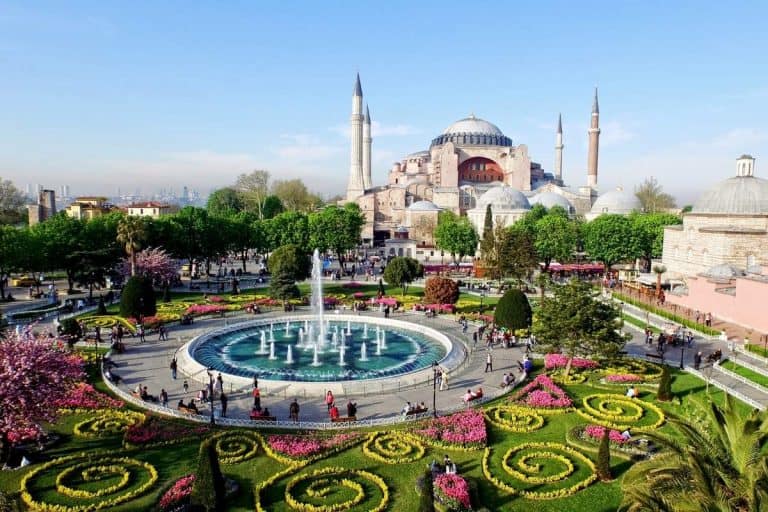Last updated on November 21, 2022
Greece has a long and rich history. The country is full of color, delicious food, and breathtaking sites, making this European country and its stunning cluster of islands a popular tourist destination. With so much history, culture, and lifestyle, it’s no surprise that there are plenty of fun facts about Greece!
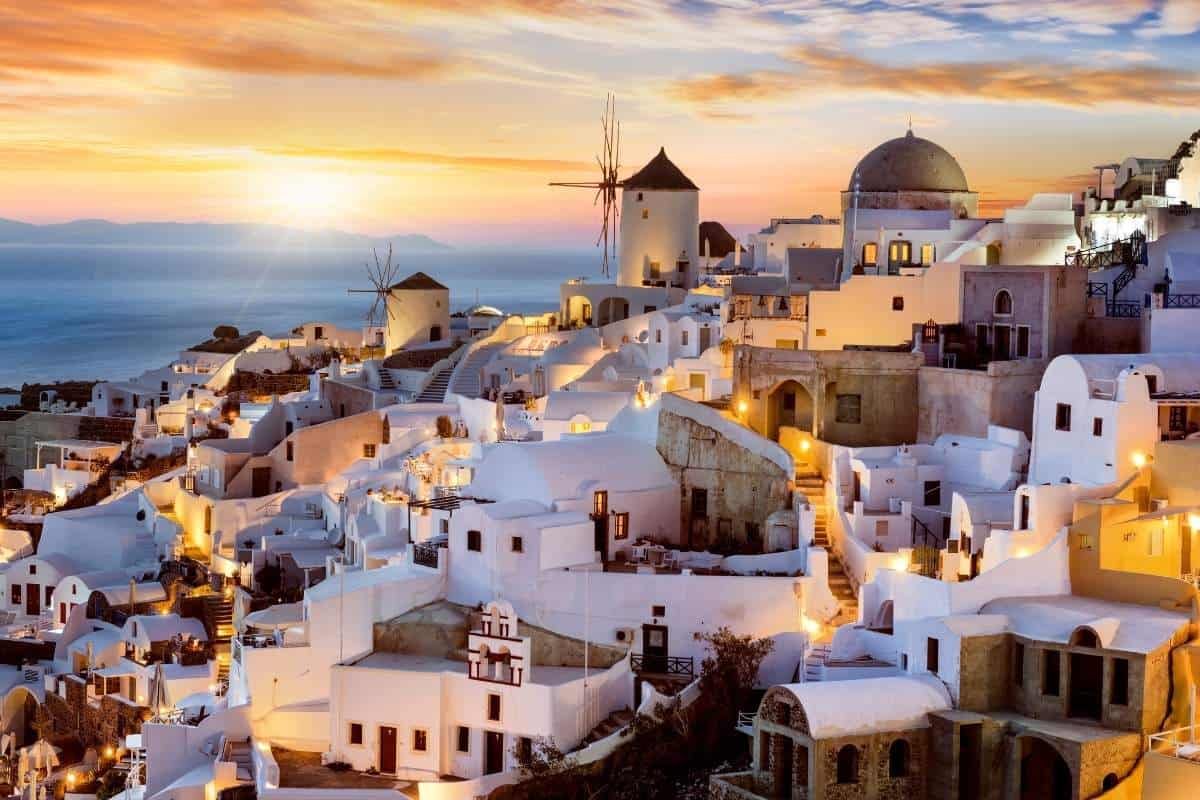
Most visitors are enraptured by what they can see and taste – including impressive archeological ruins, delicious Greek cuisine, and those iconic blue and white buildings overlooking the sea. However, dig a little deeper, and you’ll find a plethora of interesting facts about Greece. Dive in below to get started.
You think you know your stuff about Greece? Then click the link and test your knowledge with our Greece trivia quiz. Or if you’re not quite ready, keep reading to find out some cool and fun facts.
Fun Facts About Greece
Greek History
~ Greece’s capital city of Athens is named after the Goddess Athena. According to the popular legend, ‘the name-giving of Athens’, the people of Athens chose her over Poseidon. Both Gods gave the city a gift while they were deciding and she presented an olive tree while Poseidon gave water.
~ First established in ancient Greece, Athens is known as the oldest capital city in Europe.
~ One of the more well-known fun facts about Greece: Greek mythology is world-famous! The tales revolve around the 12 Olympian gods, such as the “classic” Ancient Greek deities: Zeus, Poseidon, Aphrodite, Hermes, etc.
~ Philosophy was pioneered in Greece by people like Pythagoras, Plato, Socrates, and Aristotle. The word ‘philosophy’ is actually Greek and comes from the Greek word which means “lover of wisdom.”
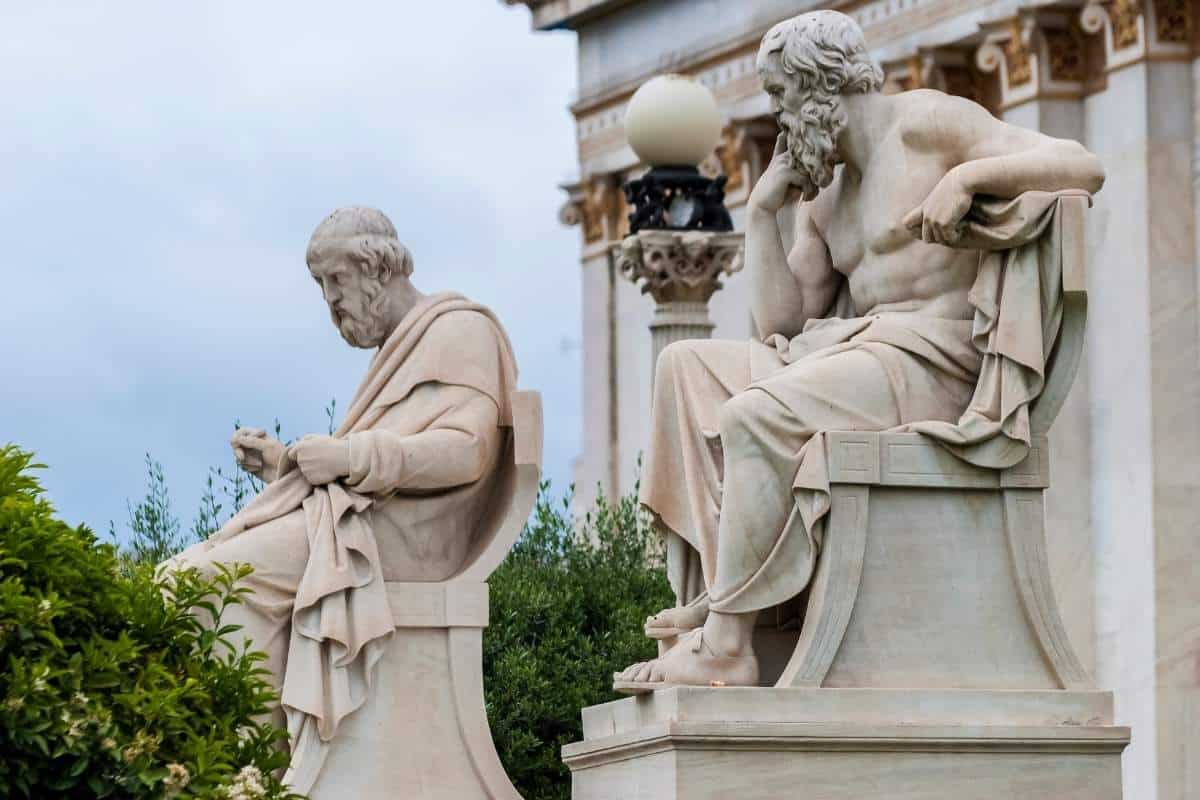
~ Meteora, which translates to “suspended in the air”, is a collection of six monasteries situated on top of several rock pillars in central Greece established in the 14th century. Access to the monasteries was deliberately difficult, with either long ladders or large nets used to haul up both goods and people. This required quite a leap of faith each time as the ropes were replaced only “when the Lord let them break”.
~ The first Olympic Games were held at Olympia in 776 BC, but it is generally accepted that the Olympics were at least 500 years old at that time. The ancient Greek Olympics, held every four years, occurred during a religious festival honoring the Greek god Zeus.
~ Ancient Greece was composed of something called City-States each with its own laws, customs, and rulers. There were more than 1000 city-states at its peak. The largest City-States were Athens, Sparta, Thebes, and Corinth.
~ The Greeks had some strange superstitions about food – some ancient Greeks wouldn’t eat beans as they thought they contained the souls of the dead! (Is that one of the most fun facts about Greece? Or the most morbid?)
~ Ancient Greeks invented the theatre. In Greece, ancient city-states had a theatre – some big enough to hold 15,000 people! Only men and boys were allowed to be actors, and they wore masks, which showed the audience whether their character was happy or sad. Some of the masks had two sides, so the actor could turn them around to change the mood for each scene.
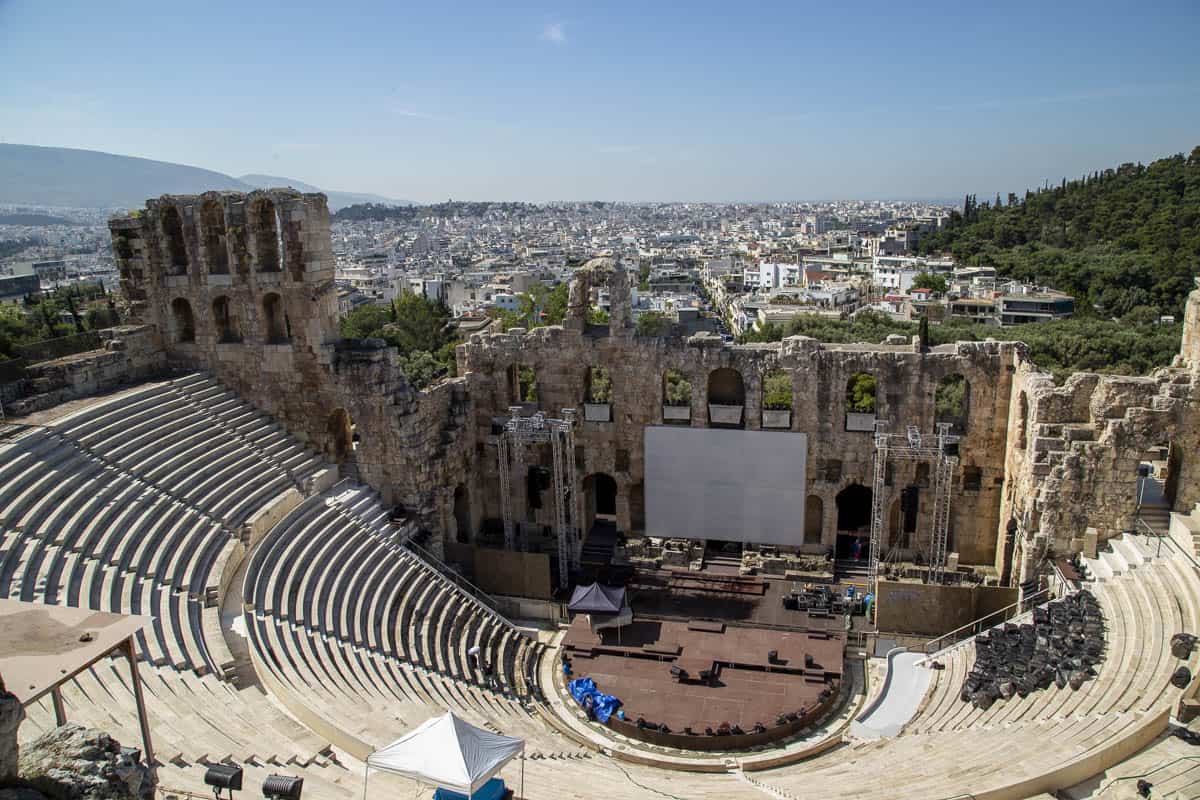
~ Most Ancient Greeks wore a chiton, a long T-shirt made from one large piece of cotton. The slaves wore a loincloth (a small strip of cloth wrapped around the waist). It’s believed that slaves in ancient Greece accounted for 40-80% of the population of city-states…that’s a lot of loincloths.
~ One of the lesser-known facts about Greece: Life expectancy in ancient Greece was only 36 years for women and 45 years for men. Of the children who were born then, only one-half managed to survive infancy.
~ The Neolithic settlements in Greece are the oldest in Europe. There is archaeological evidence of people living in Greece from around 7000 BC, much earlier than anywhere in Europe by hundreds of years probably because Greece benefited from its position as a buffer zone between the rest of Europe and the Middle East.
~ Huge walls used to connect Athens to the sea. Before being destroyed by the Romans, the walls, called the Long Walls, were constructed sometime in 500 century BC. They stretched from Athens all the way to the walled city of Piraeus on the coast as a defense against siege attempts by land.
~ Building the temple complex of the Acropolis in Athens was a social project – a way to get everyone employed in 525 BC.
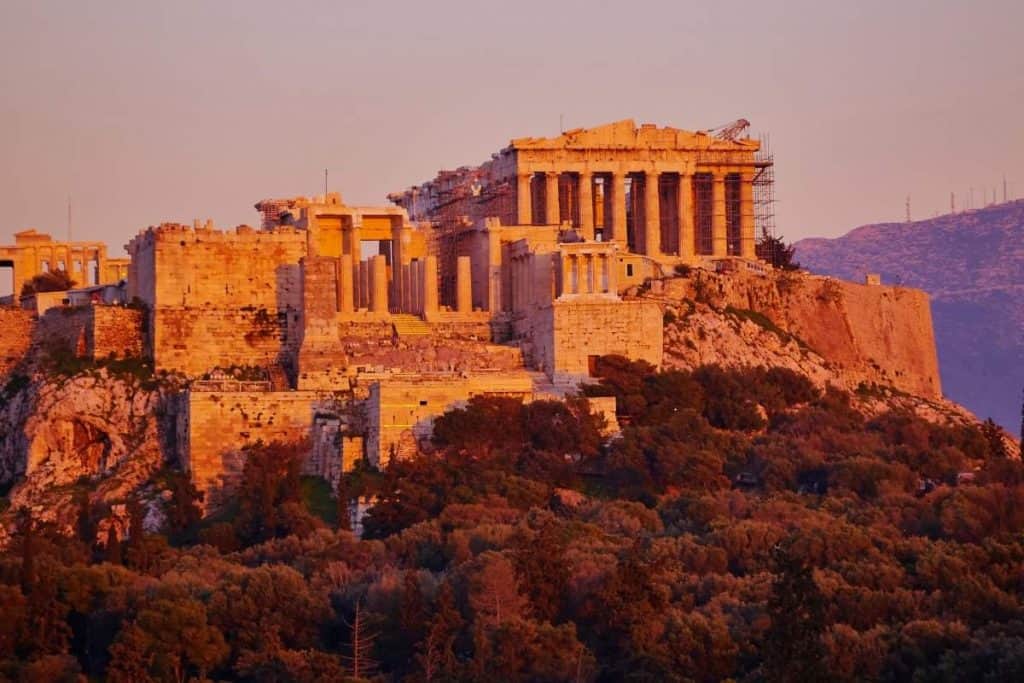
~ Greece was ruled by the Ottoman Empire for centuries. The Turkey-based Ottoman Empire conquered Greece – and most of the Balkan countries – from the mid-15th century until a fierce war of independence in 1821.
Geography
~ The island of Corfu is known for its olive trees and hosts some of the world’s oldest olive groves and currently grows over 4 million trees. A key fun fact about Greece: During the 16th century, under Venetian Occupation, the island produced olive oil for the Vatican.
~ Considering the mass amounts of beaches that you usually see in photos, this is one of the most surprising of Greek facts: around 80% of the landmass in Greece is mountainous!
~ The Greek island of Santorini is what remains after an enormous volcanic eruption created the current geological caldera. Santorini is the only inhabited caldera (volcano cauldron) in the world!
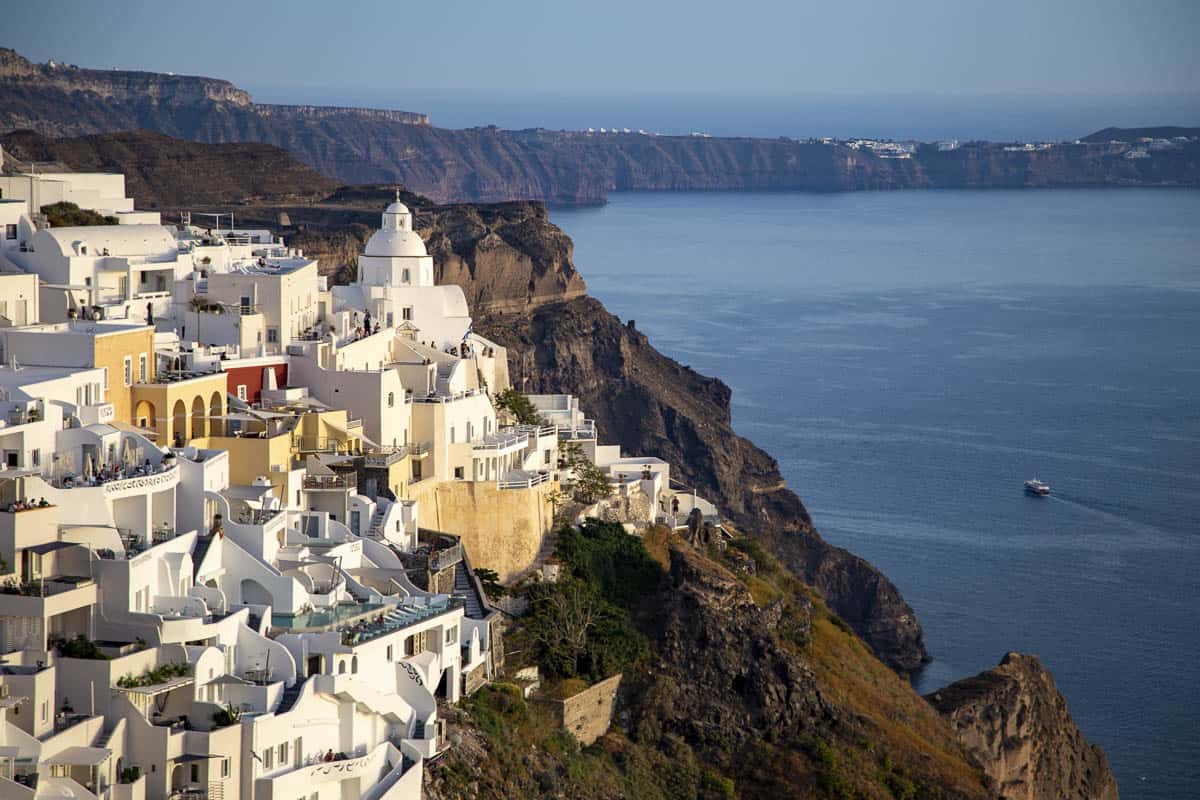
~ Additionally, because of this geology, in Ancient times, Santorini Island was known as Stongili’ in Greek which means ’round’.
~ At 9,570 ft (2,917 m), Mount Olympus is the highest mountain in Greece. According to Greek myth, Mount Olympus was regarded as the home of the gods and the site of the throne of Zeus.
~ Greece is located at the southern tip of the Balkan Peninsula. It is bordered by Turkey, Bulgaria, Macedonia, Albania, and the Mediterranean Sea.
~ Greece is divided into three geographical regions: the mainland, the islands, and the Peloponnese (the large peninsula south of the mainland).
~ Greece is one of the world’s sunniest countries, with an average of more than 250 sunny days each year. Some islands even see around 300 days of sunshine a year.
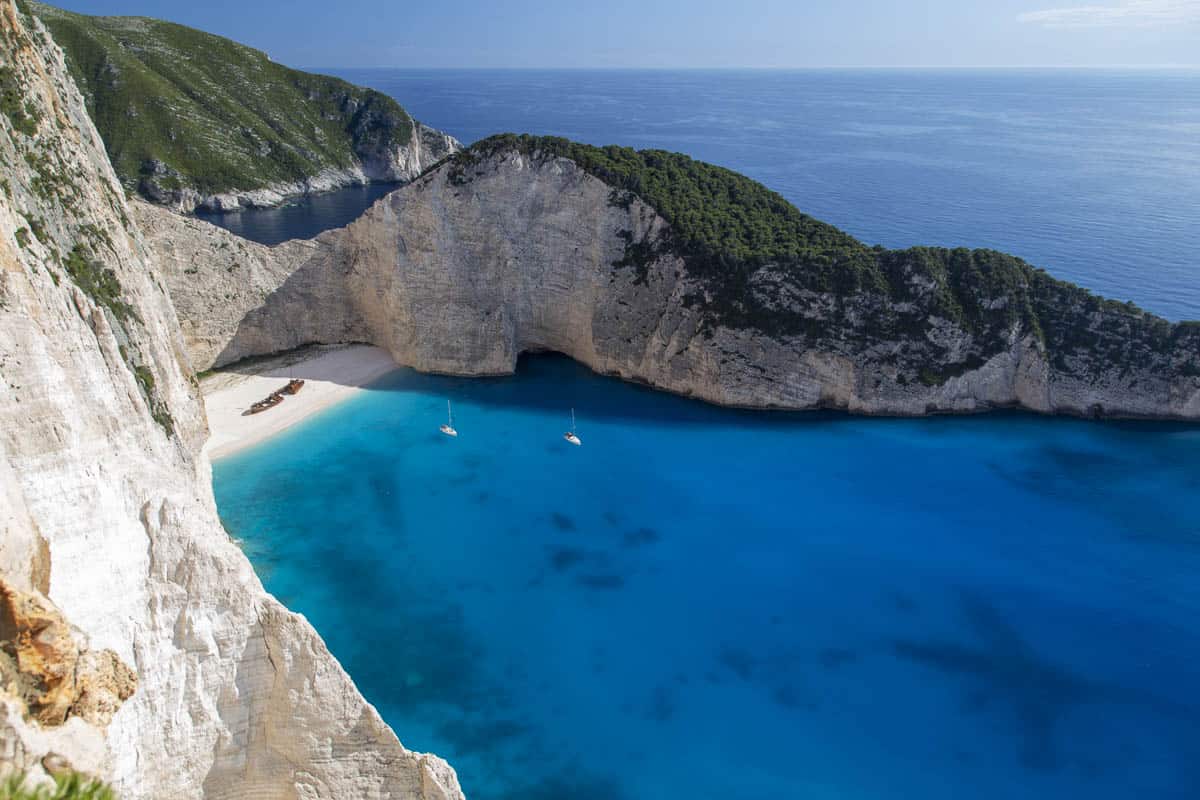
~ The Pindus mountain range contains one of the world’s deepest gorges, Vikos Gorge. At its deepest parts, this cool canyon plunges a breathtaking 1,100m.
~ Approximately 7% of all the marble quarried comes from Greece.
~ How’s this for interesting facts about Greece? It is estimated that Greece is home to up to 6,000 islands and islets, with only around 200 of them being inhabited.
~ No part of Greece is more than 135 kilometers away from the sea.
Biodiversity
~ Greece has a diverse array of wildlife with some animals found only on specific Greek islands, including seals, turtles, frogs, lizards, snakes, fish, butterflies, mice, and even the Kri-kri (the Cretan Wild Goat).
~ There are 240 bird species in Greece. Winter is special as this is when mass migration of various types of birds migrate to the wetlands of Greece each year.
~ The landscape is covered by maquis, a tangle of thorny shrubs that don’t need a lot of water. These plants include fragrant herbs such as thyme, rosemary, oregano, and bay and myrtle trees.
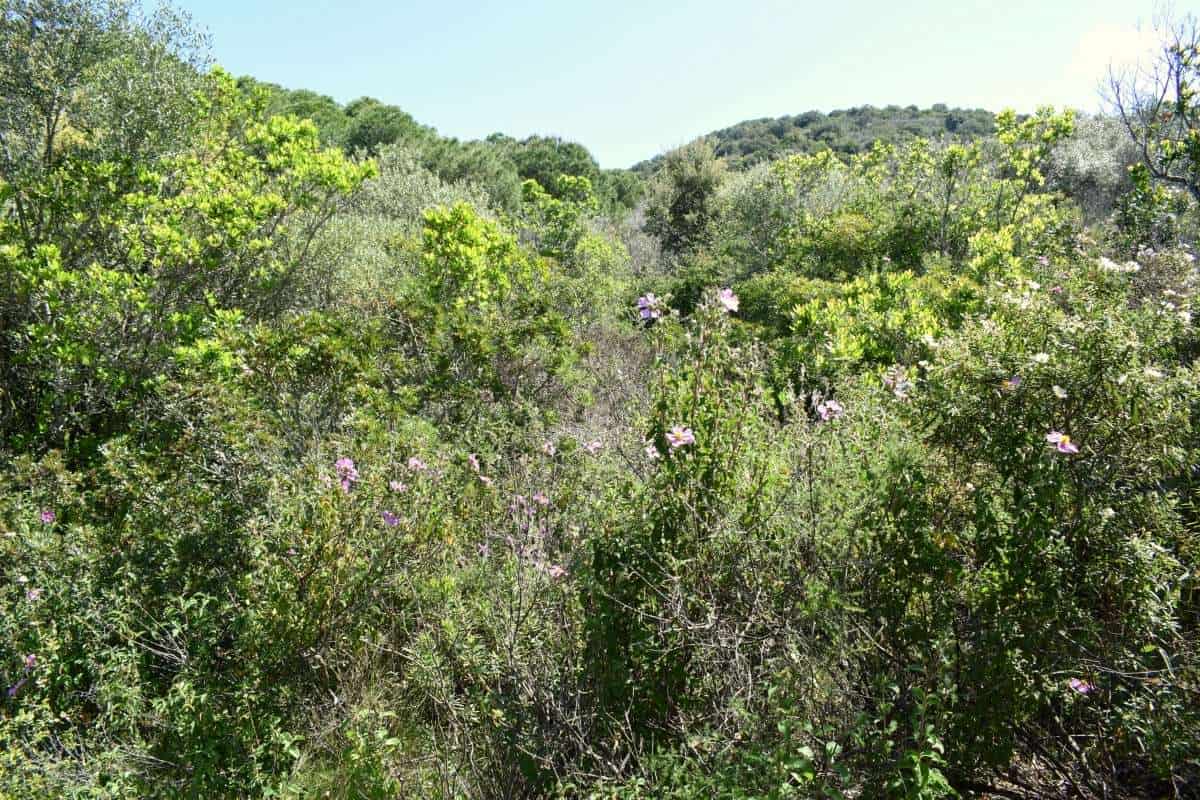
~ Greece is a main country that produces and exports natural sponges.
~ Wildlife in Greece includes 116 species of mammals, 18 amphibians, 59 species of reptiles, 240 species of birds, and 107 species of fish.
~ Greece’s national animal is the common dolphin. The dolphin symbolizes compassion, hope, and allegiance, as well as the good side of the sea, all qualities and concepts that the Greeks hold in reverence.
People & Language
~ Greek is one of the oldest written languages still in existence! The Greek language has continuously been used for more than 5000 years.
~ With that history of being the oldest written language, it’s no wonder that over 150,000 words of English come from Greece and are derived from the Greek language.
~ The current population of Greece is 10.7 million people.
~ Nearly two-thirds of Greeks live in large cities. The capital, Athens is the largest city, with over 3.7 million people crowding the metropolis.
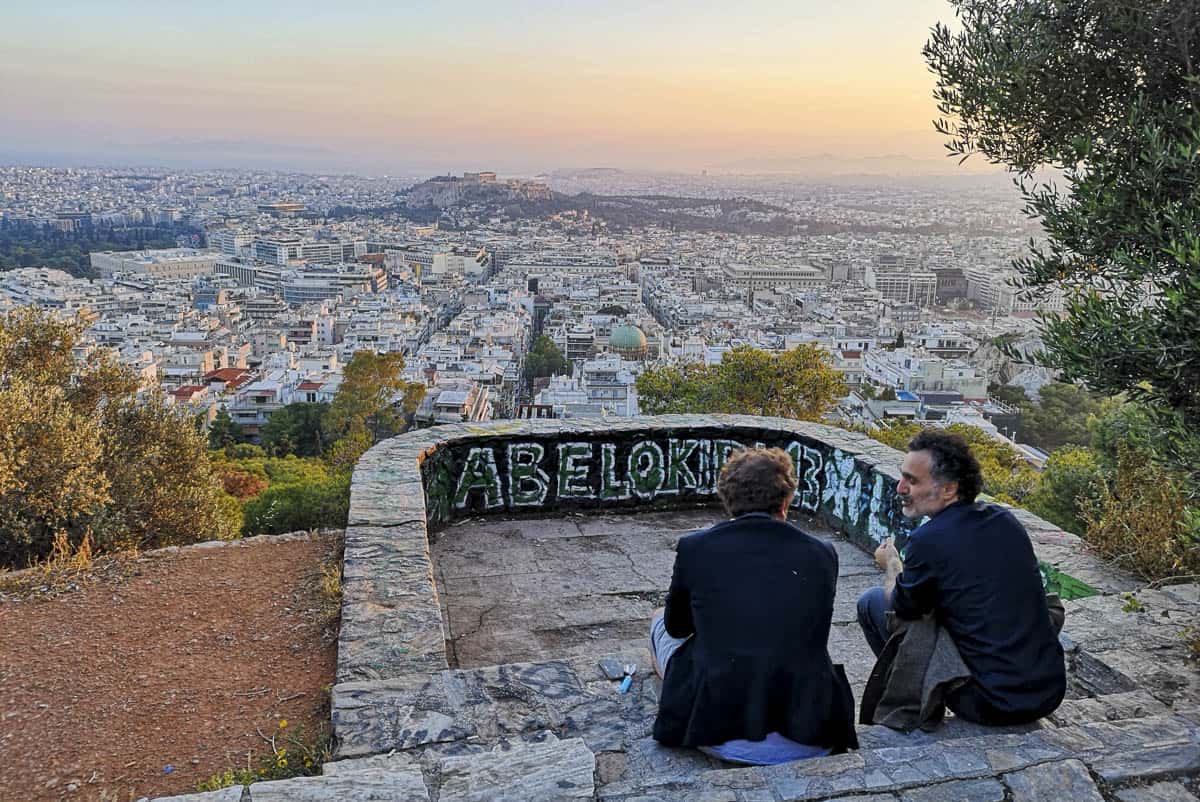
~ It’s common for Greek families to live together for a long time. Greeks usually stay with their parents until they get married, and seniors move back in with their children (or grandchildren) when they’re too old to live by themselves anymore.
~ Greece has one of Europe’s highest unemployment rates with more than 1 in 4 Greeks being unemployed.
~ Blue zones are places where people tend to live longer than anywhere else in the world. There are only five blue zones in the whole world, and the Greek island of Ikaria is one of them.
~ The “evil eye” is the most common superstition among Greeks. Many Greeks carry an evil eye token around for security, as it is believed that it can protect you from any curses an angry person might throw your way.
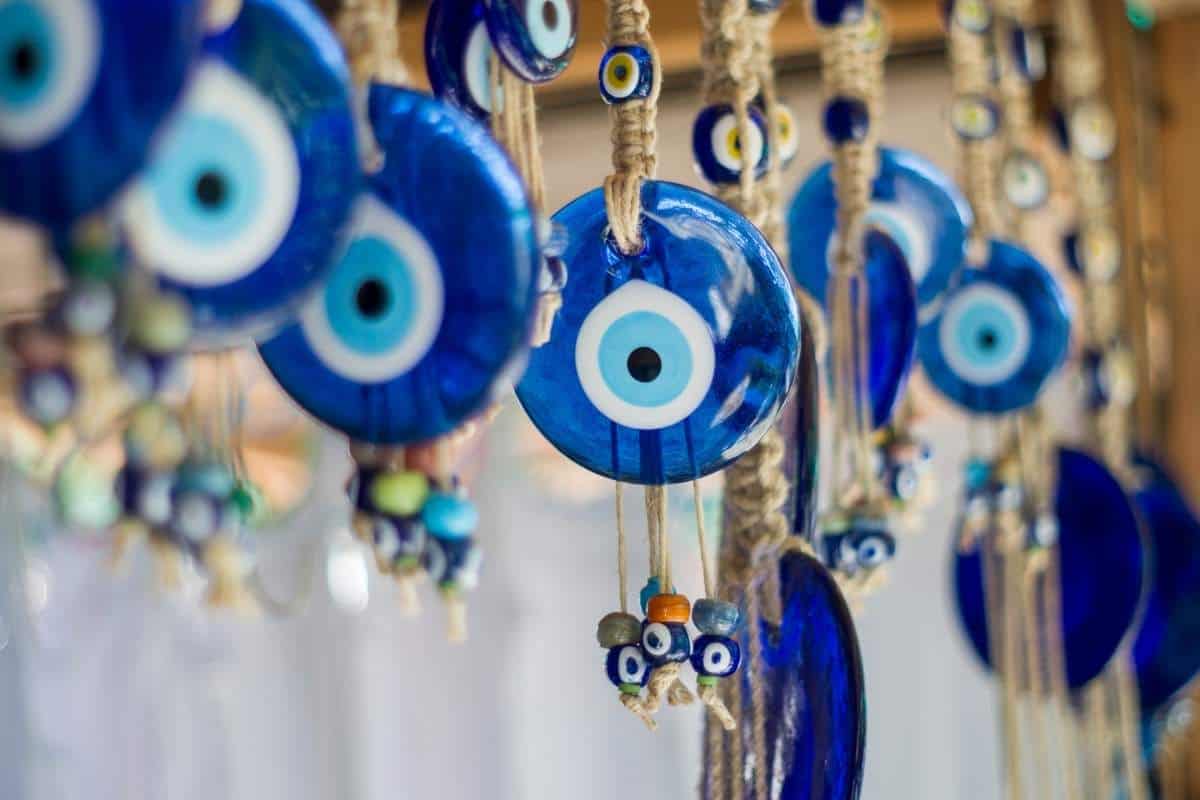
~ In the 1950s, only 30% of Greeks knew how to read and write. Today, the illiteracy rate is only 5%.
~ Around 800 BC, the ancient Greeks developed an alphabet that used separate vowels and consonants for the first time. Greek letters were adapted from an earlier alphabet invented by the Phoenicians. The Greeks passed their Greek alphabet on to other cultures and it is the ancestor of all European alphabets.
Greek Culture
~ Greece is the birthplace of democracy.
~ Greece’s official name is the Hellenic Republic.
~ Greece abolished its monarchy in 1975 and became a parliamentary republic. Under the new constitution, there is both a president and a prime minister.
~ Greece has over 4,000 officially recognized dances.
~ One of the most fun facts about Greece (if you’re a theatre nerd): Athens has more theatres than any other city in the world.
~ The customary garb of the traditional Greek Presidential Guard (‘Evzones’) is a cap with a tassel, a wide-sleeved white shirt, a pleated skirt, and shoes with a large black pom pom on the toe.
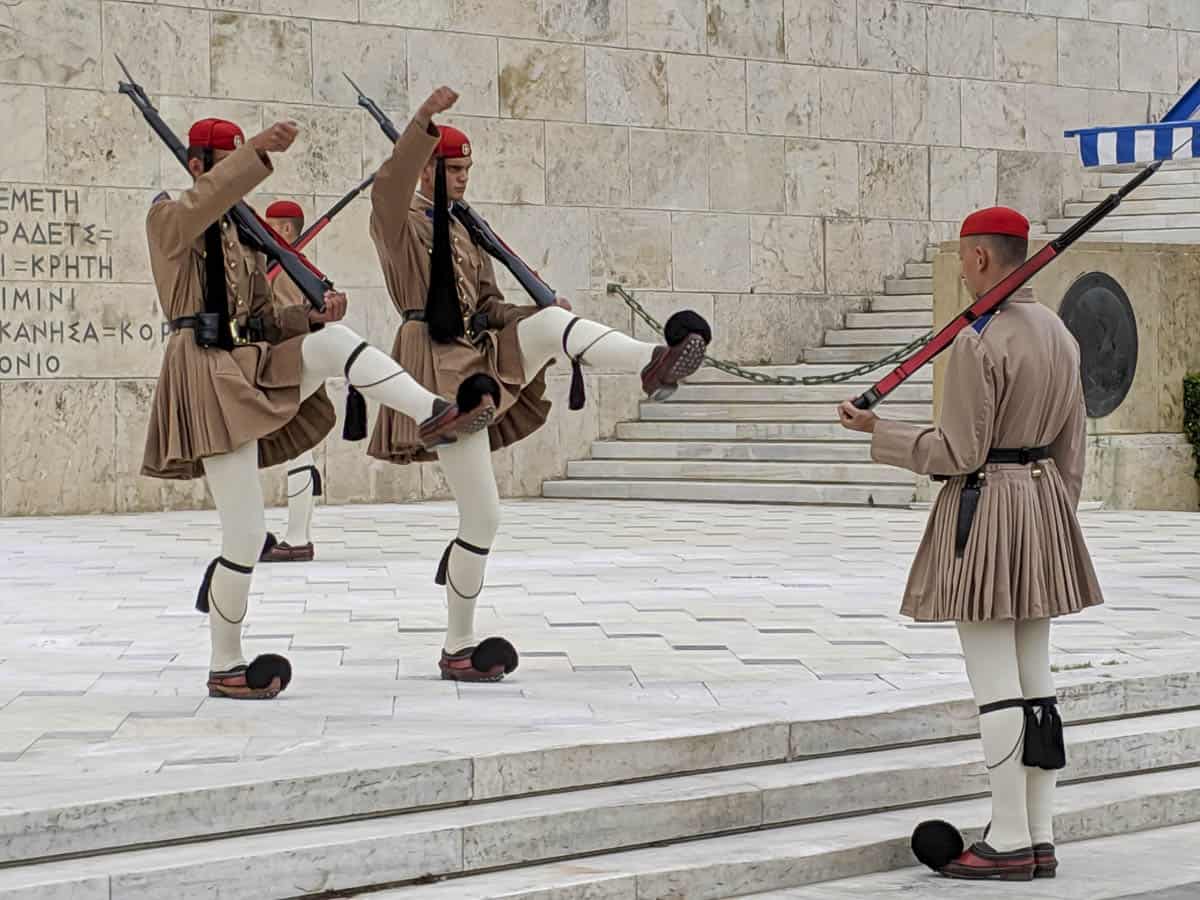
~ Males above the age of 18 have to serve in the army. The military service lasts for at least nine months.
~ Greece has more archaeological museums than any other country in the world.
~ Greece has 18 UNESCO World Heritage sites including world-famous sites like the Acropolis of Athens, the Temple of Apollo, Meteora, and the Old Town of Corfu.
~ The Greek national anthem was written in 1823 by Dionysios Solomos and is called ‘Hymn to Freedom’ or ‘Hymn to Liberty’.
~ The iconic blue doors of Greece are not only beautiful against the white concrete buildings, but they also have a function! In ancient Greece, the shade of blue known as ‘kyanos’ was used to keep evil spirits away. Hence why there are so many blue doors in Greece!
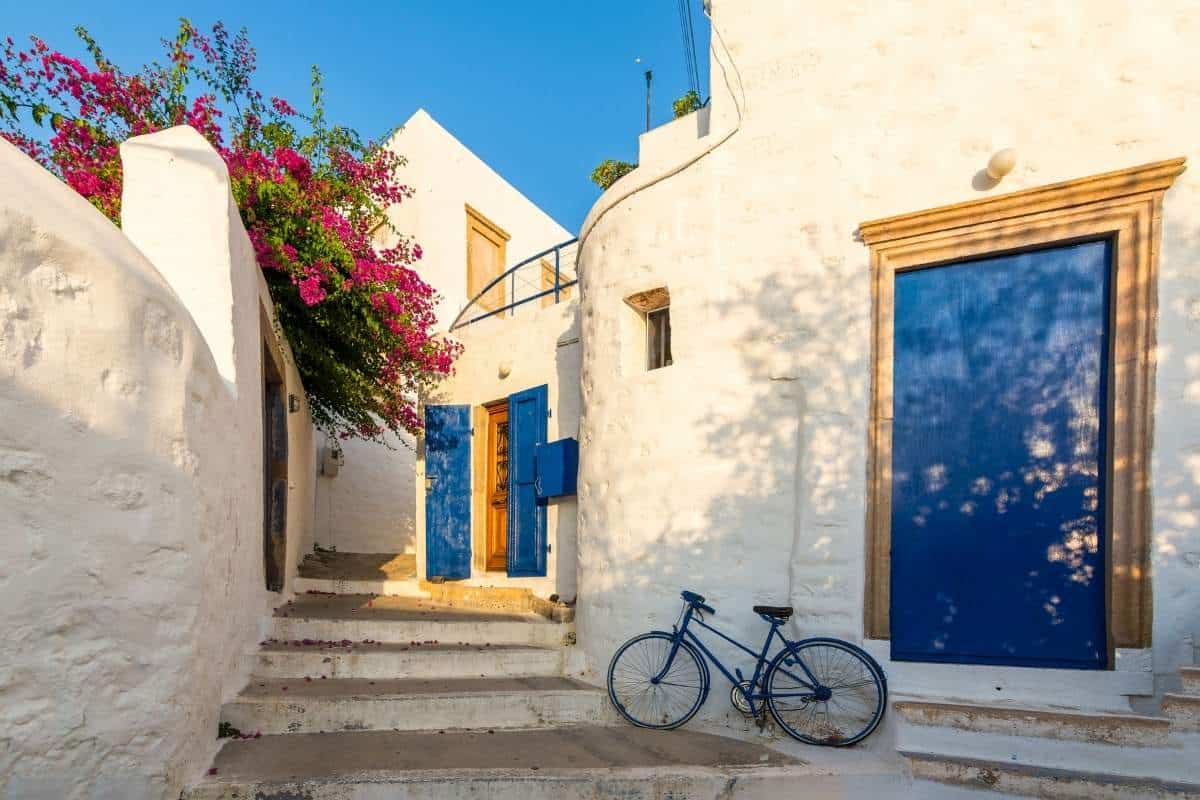
~ The current Greek flag was adopted in 1822. It is comprised of nine horizontal stripes alternating blue and white with a blue box in the upper left corner bearing a white cross. The cross symbolizes Eastern Orthodox Christianity, the prevailing religion of Greece. Some say that the nine stripes symbolize the nine letters of the Greek word “eleftheria” which translates to “freedom”
~ Before Greece adopted the Euro in 2002, its currency, the Drachma was Europe’s oldest currency.
~ Weekends are the opposite of serious business for the Greeks; Greek culture is all about resting on the weekends. To prove this point, Sundays are by law, public holidays, and have been since the late 1970s. If a Greek has to work on Sunday, they get paid a regular salary plus 75% of their salary.
~ This is one of the most fun facts about Greece: In Greece, you get to celebrate your Name Day as well as a birthday! Basically, every day of the year is dedicated to at least one saint in the Greek Orthodox tradition. For example, all the Georgios get to enjoy Saint George’s Day on April 23. If somehow your name doesn’t have a corresponding day, you get to celebrate on All Saints’ Day.
Greek Food & Drink
~ Greece is the world’s third largest producer of virgin olive oil.
~ One of the most interesting facts about Greece and olives is that some of the country’s olive trees that were planted in the 13th century are still bearing fruit today.
~ A main export for the country, Greece is the fifth largest producer of olives.
~ The Greeks began producing olives in around 3500 century BC on the island of Crete.
~ The national dish of Greece is moussaka, a Greek eggplant casserole made with eggplant, potatoes, and beef or lamb in a tomato sauce, with a creamy bechamel sauce on top.

~ Greek people, on the whole, eat very little meat and a lot of vegetables. When Greek dishes do include meat, it is traditionally lamb or seafood. This food fact about Greece is due to the fact that large livestock like cows is historically difficult to raise in the Greek landscape.
~ The biggest meal in Greece is lunch and is usually eaten at around 2 pm. A light dinner follows at around 9 pm.
~ There’s a traditional Greek cake called vasilopita that’s baked with a coin inside. A New Year tradition, if you find the hidden coin it means good luck for the coming year.
~ The popular Greek salad is comprised of tomatoes, cucumbers, olives, and feta cheese.
~ Like all good Mediterranean countries, olive oil is a big part of Greece. It’s even mentioned in Greek mythology, where the gods decided among themselves that it was more valuable than water.
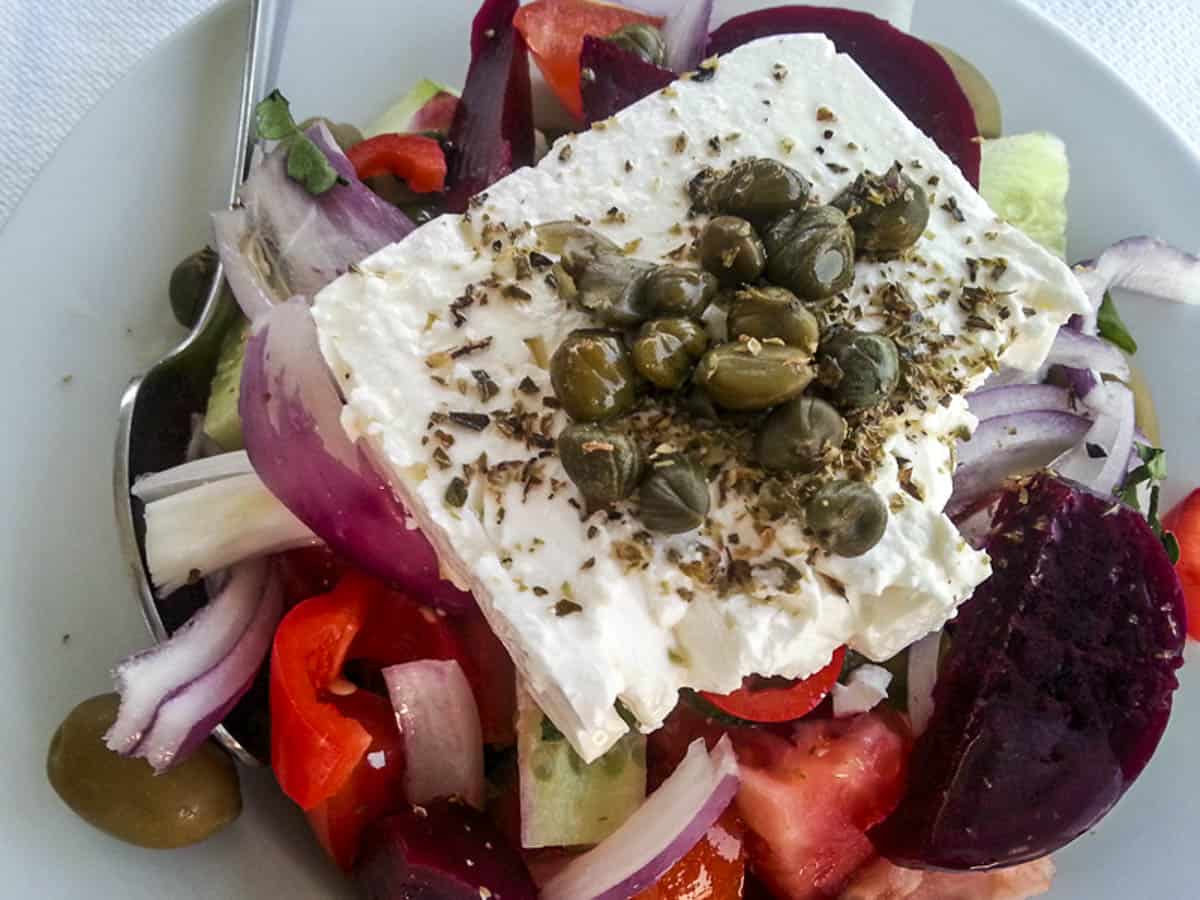
~ One of the most fun facts about Greece: Smashing plates is still a custom! It involves, yes, smashing plates. If you didn’t already know, years ago Greeks developed a penchant for smashing plates at celebrations (ie. weddings).
Two theories floating around as to why: 1) “Killing” plates in a kind of ritual to get through feelings of loss and mourning at funerals; 2) As a display of wealth – breaking plates suggests you’ve got more where those came from.
Random Fun Facts About Greece
~ More tourists from around the world visit Greece every year than the entire Greek population. Greece is one of the top 10 most visited countries in Europe.
~ The entire island of Hydra is car-free and by law, cars and motorcycles are not allowed. The main form of transportation on the island? Donkeys.
~ In certain areas in Greece, you can’t wear high heels. This is so that cracks aren’t created in the stone from the high heels and cause damage to places with such a rich history.
~ One of our favorite interesting facts about Greece is that beaches in Greece come in all shades of colors! You can see white sand, red sand, blue sand, and even pink sand beaches! With over 6,000 islands, Greece has an amazing amount of beaches to choose from.
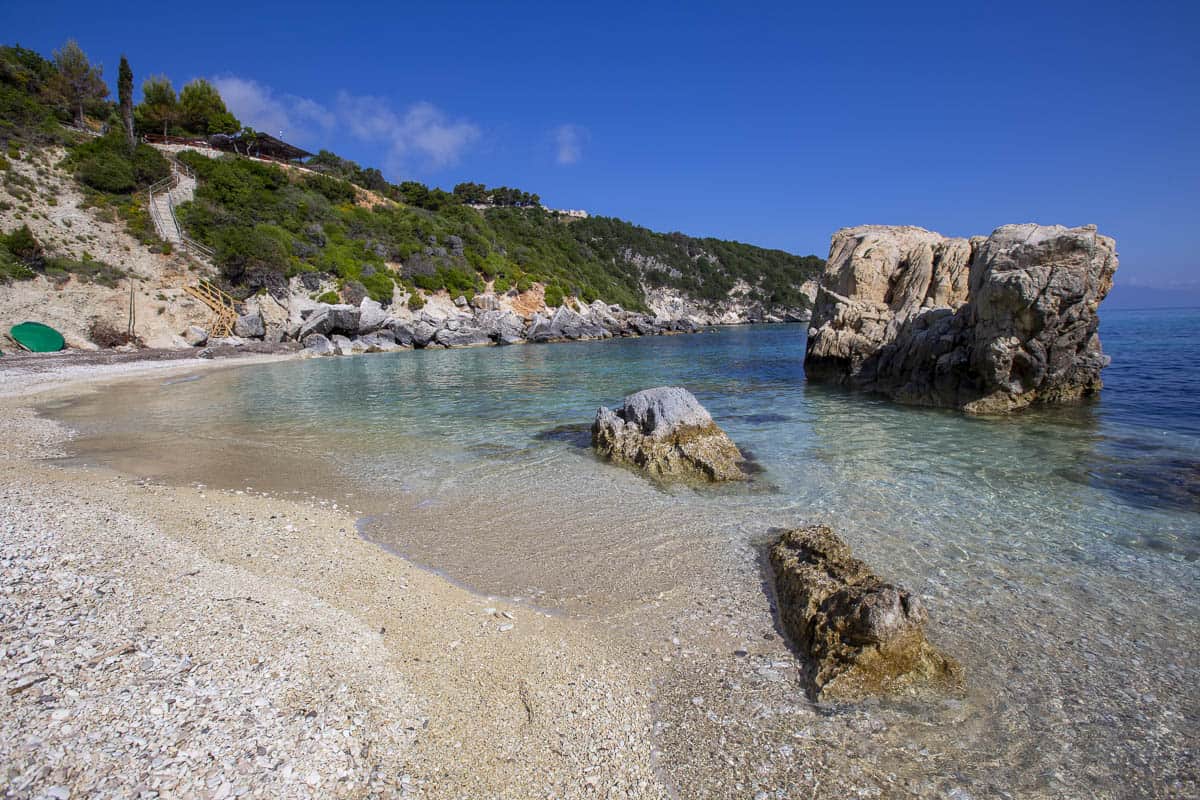
~ The yo-yo was invented in Greece in 500 BC.
~ Greece has hosted the modern-day Olympic Games twice, both in Athens. As the home of the Ancient Olympic Games, it was a natural choice as a host nation for the revival of the modern Olympic Games years ago in 1896.
~ The top three most visited archaeological sites in Greece are the Acropolis in Athens, the Temple of Poseidon, and the ancient Site of Olympia. Further, the Acropolis in Athens is one of the most famous ancient archaeological sites in the world.
~ Greece Quick Facts:
- To say ‘Hello’ in Greek: “Yasou”
- Saying ‘Thank You’ in Greek: “Efharisto”
- Currency: Euro (EUR – €)
- Weather: The weather in Greece is a Mediterranean climate. This means winters are mild and rainy, while summers are warm and dry with plenty of sunshine throughout the year.
- What to Pack: Lots of layers of warm weather clothes as the breeze off the sea can get chilly at night depending on where you’re staying. With such amazing beaches too, a swimsuit is a must!
- Transportation: Renting a car and taking ferries is the best way to get around to explore the Greek islands.
Now that you’ve read the whole post, go test your knowledge in our quiz about Greece!
[adinserter name=”Block 1″]



